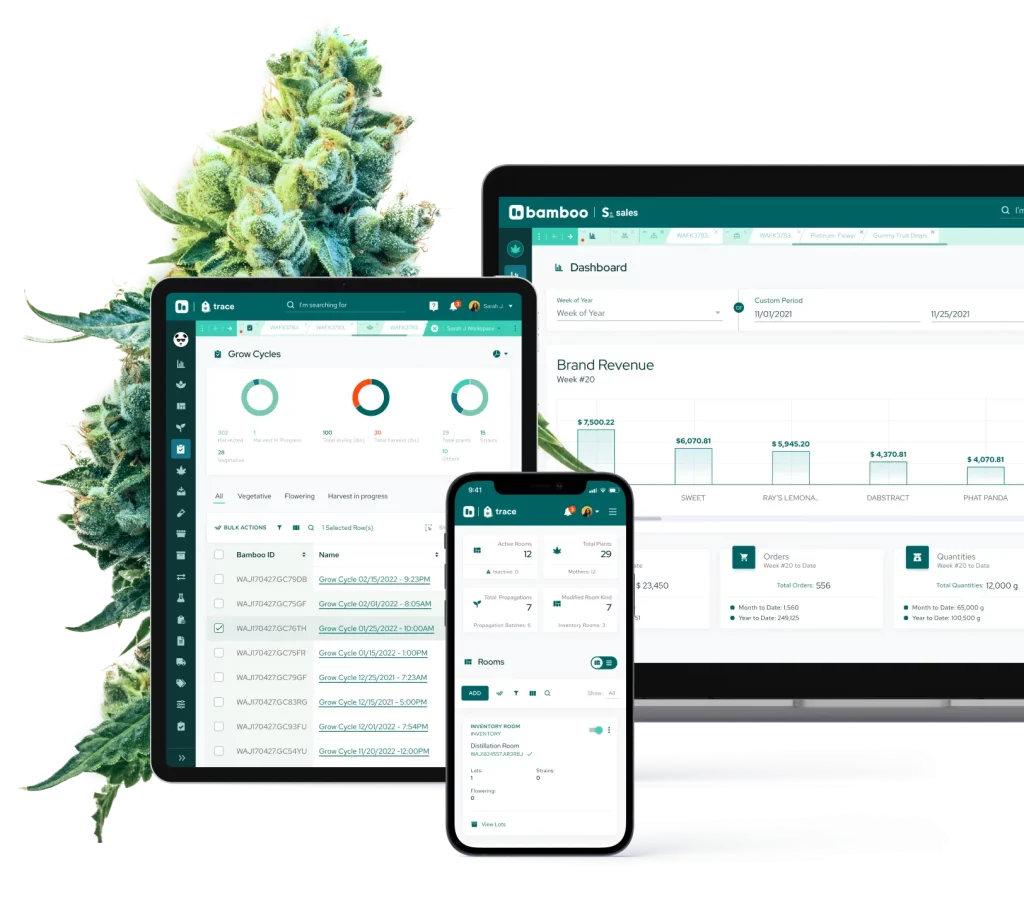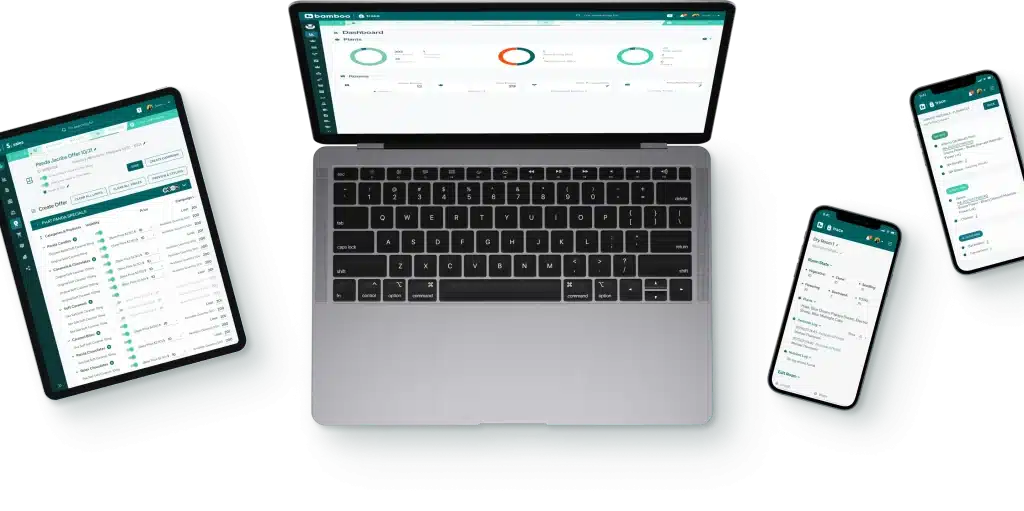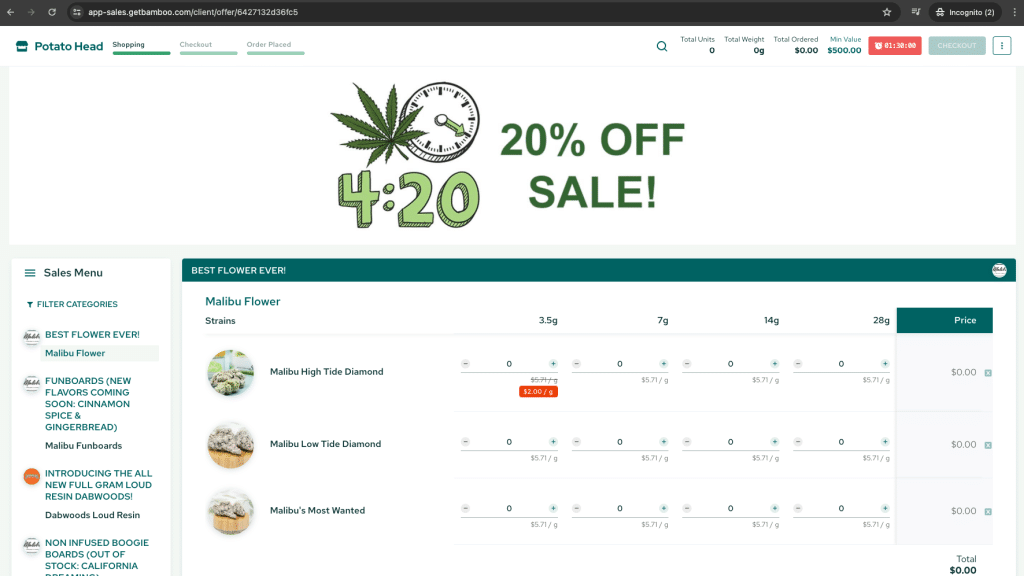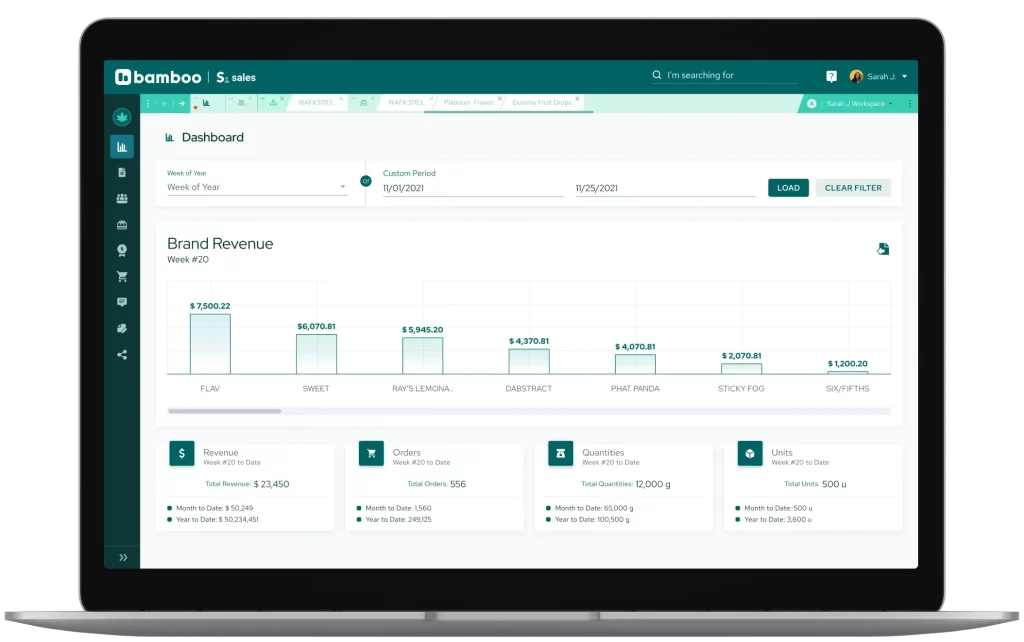Connecticut Seed to Sale Cannabis Software
Bamboo provides customized software solutions tailored to Connecticut’s cannabis industry, aiding businesses in streamlining operations, improving traceability, and optimizing sales strategies.
With Bamboo Sales and Trace, cannabis enterprises in Connecticut can effectively manage inventory, ensure compliance with state regulations, and capitalize on revenue opportunities. Featuring live inventory tracking, customizable sales interfaces, and integrated compliance tools, Bamboo empowers cannabis businesses to flourish and grow within Connecticut’s ever-evolving cannabis market.
Don’t just take our word for it – see the powerful capabilities of the Bamboo Sales enablement platform for yourself. Schedule a demo with one of our knowledgeable sales representatives and experience firsthand how Bamboo can transform your business operations. In just 10-15 minutes, you’ll get a comprehensive overview of our all-in-one solution, designed to streamline processes and drive growth. Don’t miss this opportunity to witness the game-changing features of Bamboo. Book your demo today!

Connnecticut's Recreational Market
Connecticut’s recreational cannabis market officially launched in January 2023, making it a relatively new entrant compared to other states. The market has experienced rapid growth and development as operators, regulators, and consumers adapt to the new legal landscape. Here’s an overview of some key developments:
- Sales and revenue:
- According to the Connecticut Department of Consumer Protection, total adult-use cannabis sales for the first full year of operation (January to December 2023) reached approximately $250 million.
- The state collected around $40 million in cannabis tax revenue, which is allocated to various programs, including education, public health, and community reinvestment.
- Market trends:
- As a new market, Connecticut saw a strong demand for a wide range of products, with consumers eager to explore legal cannabis options.
- Flower remained the most popular product category, followed by edibles and concentrates.
- The state’s proximity to major population centers like New York City and Boston attracted significant tourism and out-of-state consumer interest.
- Regulatory developments:
- In late 2023, Connecticut regulators implemented a series of updates to the state’s cannabis regulations, including new product safety standards and packaging requirements.
- The state also expanded the number of available licenses, with a focus on social equity applicants and communities impacted by the War on Drugs.
- Industry growth:
- The Connecticut market attracted significant investment from both local entrepreneurs and established multi-state operators.
- Several new cultivation facilities and dispensaries opened throughout the state, with a concentration in major cities like Hartford and New Haven.
- The state’s existing medical cannabis operators were among the first to enter the adult-use market, leveraging their experience and infrastructure.
- Social equity:
- Connecticut’s cannabis legalization law included a strong focus on social equity, with a portion of licenses reserved for applicants from communities disproportionately impacted by cannabis prohibition.
- The state also established a social equity council to oversee community reinvestment programs and ensure diverse participation in the industry.
- Challenges:
- As a new market, Connecticut faced some initial supply shortages and price fluctuations as operators worked to scale up production and meet demand.
- The state also grappled with the challenges of local control, with some municipalities opting to ban or restrict cannabis businesses.
Overall, Connecticut’s recreational cannabis market has experienced a promising start, with strong sales, consumer interest, and a focus on social equity. As the market matures, the state will likely continue to refine its regulations, attract new investment, and work to ensure a stable and equitable industry. However, challenges related to supply chain management, local control, and competition from neighboring states will require ongoing attention and collaboration between regulators, operators, and community stakeholders.
Connnecticut's Road to Recreational Cannabis
Connecticut’s road to legalizing recreational cannabis has been a multi-year process, culminating in the passage of Senate Bill 1201, the Responsible and Equitable Regulation of Adult-Use Cannabis Act (RERACA), in June 2021. Here’s a timeline of the key events leading up to legalization:
- 2011: Connecticut decriminalized the possession of small amounts of cannabis.
- 2012: The state legalized medical cannabis through the passage of House Bill 5389, establishing the Connecticut Medical Marijuana Program.
- 2018-2019: Governor Ned Lamont, who took office in January 2019, expressed support for legalizing recreational cannabis during his campaign and in his early tenure.
- 2019-2020: Several bills were introduced in the Connecticut General Assembly to legalize and regulate adult-use cannabis, but none were passed into law.
- January 2021: Governor Lamont renewed his push for legalization, including a proposal for adult-use cannabis in his state budget address.
- February 2021: Senate Bill 888, a comprehensive cannabis legalization bill, was introduced in the General Assembly.
- April 2021: After several months of negotiations and revisions, a new bill, Senate Bill 1201 (RERACA), was introduced, incorporating social equity provisions and other changes.
- June 2021:
- On June 7, the Connecticut Senate passed SB 1201 with a vote of 19-17.
- On June 16, the Connecticut House of Representatives passed the bill with a vote of 76-62.
- On June 22, Governor Lamont signed SB 1201 into law, making Connecticut the 19th state to legalize recreational cannabis.
- July 2021: Provisions of the RERACA allowing adults 21 and older to possess up to 1.5 ounces of cannabis and to consume cannabis in private residences took effect on July 1.
- 2022-2023:
- The Connecticut Department of Consumer Protection (DCP) began developing regulations for the adult-use cannabis industry and preparing to issue licenses for cannabis businesses.
- In February 2023, the Social Equity Council approved the first 16 adult-use cannabis retailer licenses, prioritizing social equity applicants.
- Adult-use cannabis sales are expected to begin in late 2023.
Throughout the process of legalization, Connecticut lawmakers emphasized the importance of social equity, reinvestment in communities disproportionately affected by the War on Drugs, and establishing a well-regulated, safe, and responsible adult-use cannabis market. As the state continues to implement its recreational cannabis program, it will be crucial to monitor the development of regulations and the growth of the industry.
Traceability, Compliance & Regulation in Connecticut
In June 2021, Connecticut legalized recreational cannabis through the passage of Senate Bill 1201, known as the Responsible and Equitable Regulation of Adult-Use Cannabis Act (RERACA). The Connecticut Department of Consumer Protection (DCP) is responsible for regulating and overseeing the state’s cannabis industry. Here are the key aspects of recreational cannabis traceability, compliance, and regulation in Connecticut:
- Licensing:
- The DCP will issue licenses for cannabis establishments, including retailers, cultivators, product manufacturers, and testing laboratories.
- The licensing process will prioritize social equity applicants and those from communities disproportionately impacted by the War on Drugs.
- License applicants must meet certain requirements, such as criminal background checks and demonstrating financial capability.
- Seed-to-Sale Tracking:
- Connecticut will implement a comprehensive seed-to-sale tracking system to monitor the cultivation, production, and sale of cannabis products.
- Licensed cannabis businesses will be required to use the state’s tracking system to record and report inventory, sales, and transfers of cannabis products.
- Product Testing and Safety:
- All cannabis products must be tested by licensed third-party laboratories for potency, contaminants, and other quality control measures.
- Products must meet specific safety and quality standards before they can be sold to consumers.
- Packaging and labeling requirements ensure that products are properly identified and include necessary warnings and disclosures.
- Purchase and Possession Limits:
- Adults 21 years and older can purchase and possess up to 1.5 ounces of cannabis flower or an equivalent amount of other cannabis products.
- Cannabis products can only be purchased from licensed retail stores.
- Home Cultivation:
- Starting July 1, 2023, adults 21 and older will be allowed to cultivate up to six cannabis plants (three mature and three immature) at their primary residence for personal use.
- Households with more than one adult can grow up to 12 plants (six mature and six immature).
- Taxation:
- Recreational cannabis sales will be subject to a state tax rate of 3% in addition to the standard 6.35% sales tax.
- Municipalities can also impose a local tax of up to 3% on cannabis sales.
- Social Equity and Reinvestment:
- A significant portion of cannabis tax revenue will be directed towards communities disproportionately affected by the War on Drugs.
- The Social Equity Council will oversee programs to support individuals from these communities in participating in the cannabis industry.
- Advertising and Marketing Restrictions:
- Cannabis businesses will be subject to strict advertising and marketing regulations to prevent targeting underage individuals and to promote responsible consumption.
- Advertising cannot be misleading or deceptive and must include required warnings and disclosures.
- Enforcement and Penalties:
- The DCP will be responsible for enforcing cannabis regulations and conducting inspections of licensed establishments.
- Violations can result in fines, license suspensions, or revocations, depending on the severity and frequency of the infraction.
These regulations aim to establish a safe, regulated, and equitable recreational cannabis industry in Connecticut while prioritizing public health, safety, and social justice. As the state continues to develop its cannabis regulatory framework, businesses operating in the industry must stay informed about any changes or updates to these regulations to maintain compliance.
What are the drawbacks of cannabis marketplaces?
Cannabis marketplaces in Connecticut offer a wide array of brands and products for buyers to browse through, much like flipping through a magazine or catalog. While this is convenient for buyers, it often leads to a race-to-the-bottom mentality among sellers, as they compete to undercut each other on price.
Marketplaces like those available in other legal states, while beneficial in theory, provide little added value beyond serving as a platform for brands to showcase their products. As a result, sellers in Connecticut have limited control over how their products are presented and struggle to differentiate themselves.
Bamboo was created to address this issue by empowering Connecticut’s cannabis brands to customize their own sales menus and take control of how their products are showcased to clients and buyers within the state’s regulated market. By providing tools to build personalized menus and recommended orders, Bamboo enables brands to stand out and drive higher sales. Why? When buyers are focused on your cannabis brands and products, they tend to pay more attention and often make larger purchases.
Ultimately, the success of a cannabis brand in Connecticut depends on the effort put into crafting and optimizing its sales menus. While it may be tempting to rely on marketplaces for exposure, brands that take control of their sales menus and strategies often see greater success in the long run within the state’s industry.
Bamboo Trace
✔ Quick-action buttons available in every module for swift navigation and action execution.
✔ Simplified traceability through real-time two-way synchronization with Connecticut’s seed-to-sale system (BioTrack).
✔ Receive instant notifications for important updates and events.
✔ Work in offline mode, accessible on both mobile and desktop devices, especially useful during periods of downtime in BioTrack API systems.
✔ Ability to support multiple licenses for comprehensive management of operations.
✔ Customize label templates to meet Connecticut’s BioTrack regulations and efficiently generate multiple labels for various plant and product requirements.
✔ Comprehensive management of Strains, Rooms, Propagations, Grow Cycles, Plants, Harvests, Disposals, Inventories, Conversions, QA Samples, and more, all integrated within Bamboo Trace.
✔ Effortlessly process orders and generate manifests in just minutes for enhanced efficiency.

Bamboo Sales
✔ Utilize the finest Sales Menus available in Cannatech for enhanced sales strategies.
✔ Seamlessly integrate Sales Menus with your website for expanded reach and accessibility.
✔ Simplify email marketing efforts with the built-in feature tailored for sending sales menus effortlessly.
✔ Gain insights through comprehensive sales analytics and reporting on clients, sales reps, and customizable metrics.
✔ Generate numerous recommended orders (proposals) to cater to diverse client needs.
✔ Customize Real-time Sales Menus according to preferences and branding.
✔ Easily manage discounts, credits, pricing tiers, and distribution lists for streamlined operations.
✔ Efficiently handle all your sales enablement strategies within the Bamboo Sales platform.

